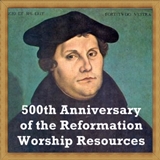24 Pentecost
Reformation Sunday
John 15:1-11 
These words of Jesus are spoken to his disciples in the context of the Last Supper, of his last meal with them. The context is important, not just to the Lord’s Supper imagery of the grape vines and wine. Jesus is about to go the cross. He will not have another chance to speak with his disciples before his death. In this passage, the words he speaks are meant to comfort and to encourage. In a sermon on this text Luther says that if we do not hear comfort in this text, then we have missed the point. Luther pointed out that Jesus himself took comfort in these words. The reason is that they remind him and us of who he is. First in relation to the Father, and second, in relation to us.
But before we come back to this – I want to point to a recent development in how we should translate this text. significantly, the word translated vine is this passage, ampelos, is the classical Greek word for vine, but it has come to mean vineyard in modern Greek. And the word used in classical Greek to me branches, klaemata, has come to mean vines. In Homer’s time ampelos would have just been vine. By 600 CE if would have only been vineyard. Only in the last few years have scholars bothered to look into just when this change came about. They found that already in Aesop’s Fables, 250 years before Jesus, it is used as vineyard, though in the translation of the Hebrew Old Testament, 100 years before Jesus, it was used still as vine. Significantly, in the book of Revelation, it is clearly used to mean vineyard. So the word was in transition at the time of Jesus and at the time of the writing John’s Gospel. More formal writing tended to use another form for vineyard, namely ampelon, and the language of the common people tended to use ampleos, which is the word in our text today that is traditionally translated vine. But which did John intend? Well, a big clue is the phrase in verse 2, ‘he removes every branch in me that bears no fruit.’ The word removed does not mean pruned but means uprooted or pulled out. This is what one does to a vine, not a branch. So we have translated eh word awkwardly as removed to give the impression of pruned, so that it will fit with our perceived interpretation of ampelon. Also, if Jesus said he is the true vineyard, this passage makes more sense in light of the two songs of vineyards in Isaiah. (More on this later). So Jesus most likely said, ‘I am the true vineyard.’ It also makes more sense to remain ‘in’ a vineyard than to remain ‘in’ a vine. In any event, whether Jesus is the vine and we are the branches, or whether he is the vineyard and we are the vines attached to it, the meaning of the passage is little changed. So don’t lose sleep over this one!
In these words (whether vine or vineyard) we have the seventh and final of Jesus’ famous ‘I am’ metaphors. We have already learned that Jesus is the ‘Bread of Life’ (6:35); ‘the Light of the World’ (8:12); ‘the Door’ by which the sheep enter the sheepfold (10:9); ‘the Good Shepherd’ (10:11,14); and ‘the Way, the Truth and the Life’ (14:6).
And now Jesus tells us that he is the true vineyard.
He has given us another metaphor to help us to understand who he is. And he uses it twice. Once in relation to the Father, and once in relation to us.
Jesus first tells us, ‘I am the true vineyard, the Father is the grape grower.’ The vineyard imagery of the Old Testament, especially of Isaiah and its two vineyard songs, are very much in mind here. There Israel is the vineyard, but God is disappointed. They have not born fruit.
In contrast, Jesus is the true vineyard. The hope connected to Israel, especially hope for salvation to be extended to all the world, finds its fulfilment not in a nation, but in a person. In Jesus. He is the true vineyard. And God the Father is the farmer who tends the vineyard. It is the Father who prunes us so that we will grow stronger and bear more fruit.
Ancient vineyards were well tended and cared for. They were smaller affairs than the commercial vineyards we often see today. They were often enclosed by a stone wall. They were regularly weeded and pruned and watered. They were not just a source of income, but a source of great pride. And Jesus tells us that he is God’s true vineyard.
Then Jesus repeats the metaphor. But this time he points to his relationship to his disciples and to those of us who would later follow him. Jesus says, ‘I am the vineyard and you are the vines.’
It is important and a comfort to know that Jesus is the vineyard. As vines, we live and grow and flourish within the vineyard, within Jesus. Our lives and our being are contained within Jesus and flourish within him. That is what is means when Jesus says he is the vineyard and we are the vines.
Finally, this text is about abiding, or remaining in Jesus. The word translated to abide or to remain is used 11 times within 11 verses. This is a literary device we have seen previously in John’s Gospel, for instance with the words testify and testimony, in which he repeats a word multiple times in close succession, with slight alterations in the meaning and context with each repetition. This is John getting the reader’s attention. This text is about us remaining in Jesus and him remaining with and in us. And this thread of remaining in Jesus underscores the theme of comfort that so struct Martin Luther when he read this text. Luther said in a sermon nearly 500 years ago that ‘whoever views this comforting image rightly and believes will be bold in facing whatever troubles we encounter in our lives.’ And by the way, this is Reformation Sunday, so there was always going to be an obligatory quote from Luther in the sermon!
On a more sensitive matter, some of you might be concerned about the phrase in verse two that the Father removes from the vineyard every vine that does not bear fruit. It sounds like a warning. What if we do not bear enough fruit? To this question we first need to point out that the theme of the text is about remaining in Jesus, not about the possibility or fear of being uprooted. Jesus himself in verse 11 tells us the purpose of the words he has just said. ‘I have said these things to you so that my joy might be in you and that your joy might be complete.’ This image of the vineyard and the vines not only brings comfort, but Jesus intends them to bring joy. If we focus on the fear that we might be uprooted, then these words of Jesus have not had the effect he intended. Because of our human weakness, our tendency to fall short and to worry that we are not good enough before God, we are prone to worry that we could be uprooted if we do not meet our spiritual KPIs.
But this is not the intent of the image of Jesus as the true vineyard or of this text. The text states several key realities for those who follow Jesus. We remain in Jesus. We remain in the vineyard. We remain in Christ’s love. And in remaining in Jesus we are Jesus’ disciples, and we do bear fruit. And in this Jesus has great joy, and the Father is glorified. These are statements of fact in the text. The text is not only about who Jesus is as the vineyard, but it is also about who we are as the vines within that vineyard. True, there will some pruning, through the hearing of his word. But this is necessary if we are to bear even more and better fruit. But the point is that we are in the vineyard. That is why we are being pruned. And the Father watches over and protects us. Jeus loves us, and we remain in his love.
The reference about vines that do not bear fruit being uprooted is indeed a warning. We should never be presumptuous about God’s grace. But given that Jesus calls himself ‘the true vineyard’ it seems that this statement is meant to contrast the vineyards of Isaiah that did not bear fruit. Israel as a nation did not do justice, they did not bear fruit. So the true vineyard has come in the person of the Messiah.
In summary, this is what we learn in this text and what we learn about Jesus as the true vineyard.
- We learn who Jesus is in relation to the Father and in relation to those who follow him. Jesus is the vineyard that the Father loves and keeps. And Jesus is the vineyard in which his people are kept safe as vines.
- We have also seen that the theme of this text is not about leaving the vineyard or warnings about being uprooted. The theme of this text is about the reality of our remaining in the vineyard, remaining in Jesus, remaining in his love. The repetition of the word ‘remain’ 11 times in these verses makes this emphasis clear. And because we remain in Jesus, we are his disciples and we will bear fruit – even if we do not always see it clearly and even though all of us will need regular pruning to help us bear fruit.
- Finally, Jesus says these words to his disciples on the night before he will go to the cross. He says these words to bring comfort and joy. By remaining in Jesus, by remaining in the vineyard, we have his joy, and that joy is complete.
And these things all fit together. To follow Jesus means to be a vine in his vineyard under the Father’s care. It means that we have his love. It means that we will bear fruit. And it means that this brings joy to Jesus and that his joy becomes our joy.
There is no better place than to be within God’s vineyard. There is no better place than to be within Jesus.
Amen.
Pastor Mark Worthing.
Port Macquarie.





